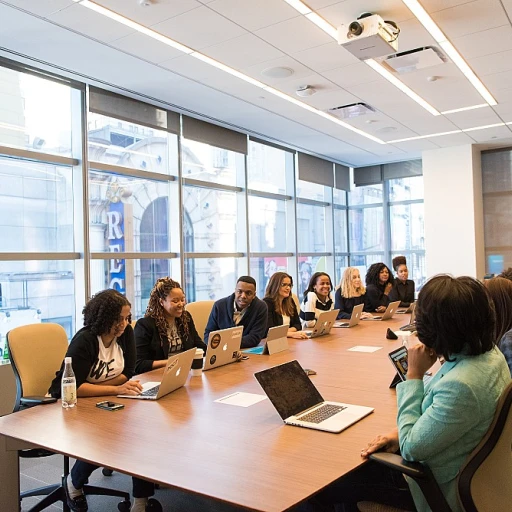Understanding Self-Leadership in the Workplace
Exploring the Power of Self-Leadership in the Workplace
In today's fast-paced work environment, self-leadership stands as a pivotal approach that empowers employees to take charge of their personal and professional development. Self-leadership isn't just about possessing leadership skills; it's about cultivating a self-awareness that facilitates continuous personal growth, ultimately benefiting the entire organization.
For employees and individual contributors, developing self-leadership encompasses a range of skills that include emotional intelligence and the ability to effectively manage oneself. Each individual involved in this transformative journey learns to elevate their mindset and skillset, contributing significantly to the organization's success.
In fostering an environment where self-leadership can thrive, it's crucial for organizations to include structured training programs. A dedicated self-leadership workshop offers participants the opportunity to engage in learning sessions that enhance leadership effectiveness and build leadership skills. This includes a focus on coaching, team building, and leadership training tailored to their needs.
Managers and team leaders who are keen on developing leadership within their teams must understand the underlying principles of self-leadership. Engaging employees in virtual sessions or in-person workshops allows them to explore their potential and develop the necessary skills to excel in their roles, creating a ripple effect within all levels of the organization.
Are you exploring ways to enhance employee engagement through self-leadership? Understanding the intricacies of self-leadership at work can be a game-changer, equipping employees with the tools to navigate their personal growth journey effectively. This transformational process not only elevates individuals but also propels organizations towards achieving robust leadership development.
For more insights on
navigating remote work challenges in training and development, visit our insightful resources to deepen your understanding and application of self-leadership in the workplace.
Leveraging HR Communication for Self-Leadership Initiatives
Human resources communication plays a crucial role in fostering self-leadership within an organization. This involves the use of strategic communication techniques to promote the core values and objectives of self-leadership, ensuring that employees understand and embrace the benefits of self-leadership development. By effectively communicating the purpose and potential outcomes of self-leadership workshops, HR can significantly enhance employee engagement and participation.
To elevate leadership skills among participants, HR must first ensure that the communication strategies are clear, consistent, and aligned with the organization’s goals. This clarity not only helps in setting the expectations for the program but also aids in fostering an environment conducive to self-awareness and personal growth. Participants will better appreciate the workshop's relevance to their personal and professional development when these connections are well-communicated.
Moreover, HR communication should be designed to cater to different levels within the organization, addressing the varying needs of individual contributors and leaders alike. This means crafting messages that resonate with the specific challenges and aspirations of employees across the organizational hierarchy. By tailoring communication to the diverse audience, HR can motivate both leaders and employees to actively participate in self-leadership training programs.
Effective HR communication also involves creating a culture of learning and self-improvement. This cultural shift can be supported through regular team-building activities, virtual sessions, and feedback loops that allow participants to express their learning experiences and the impact of such workshops on their work performance. These communication channels serve as platforms for exchanging insights, sharing success stories, and reinforcing the importance of leadership development as part of employees’ career growth.
Designing an Effective Self-Leadership Workshop
Crafting a Workshop for Growth: Self-Leadership
Creating an effective self-leadership workshop involves careful planning and understanding of workforce dynamics. A successful workshop should be designed to equip participants with leadership skills that elevate both personal and professional development. Here's how you can structure this pivotal session:
- Objective Alignment: Clearly define the workshop's goals to align with organizational objectives. This ensures that employees recognize the value and relevance of enhancing their self-leadership skills.
- Interactive Sessions: Incorporate interactive elements such as group discussions, role-playing, and real-life scenario analysis. This allows participants to actively engage and apply new concepts, fostering a deeper understanding of leadership dynamics.
- Self-Assessment Tools: Use self-awareness instruments that help employees evaluate their current leadership capabilities. These assessments can guide personal coaching sessions and tailor development training to individual needs.
- Learning Modules: Structure the workshop into modules that gradually build upon each other. Focus on mindset skillset development, emotional intelligence, and effective communication, creating a holistic approach to leadership training.
- Real-Life Application: Encourage participants to apply learning outcomes within their team environments. This could involve setting personal goals or implementing strategies discussed during the session.
- Feedback and Evaluation: Feedback mechanisms are crucial for assessing the workshop's success. Collect insights from participants on what worked and what could be improved. This feedback loop enhances future training effectiveness.
Further insights into creating impactful workshops can be drawn from
exploring opportunities with the United Way Job Bank, which also emphasizes employee engagement and leadership development across different levels of the organization.
By designing a workshop that integrates these elements, organizations can nurture individual contributors into self-leaders, thereby enhancing leadership effectiveness and fostering a culture of continuous learning.
Benefits of Self-Leadership Workshops for Organizations
Empowering Employees through Self-Leadership Workshops
Organizations looking to elevate leadership effectiveness often turn to self-leadership workshops as a powerful tool for employee development. These workshops offer a blend of leadership training, learning, and personal growth opportunities that focus on boosting leadership skills and fostering a deeper self-awareness among team members.
Self-leadership workshops are uniquely designed to cater to both existing leaders and individual contributors, promoting a mindset shift to enhance overall work performance. Participants will learn through immersive sessions that combine emotional intelligence training, leadership development, and practical exercises geared towards personal and professional growth.
Contributing to Employee Engagement and Development
The benefits of self-leadership workshops extend beyond immediate skill acquisition. They are instrumental in increasing employee engagement by empowering individuals to take charge of their own leadership journey. Employees who participate in such programs often report higher satisfaction and motivation levels, as they are equipped with the tools to navigate complex work environments and overcome challenges effectively.
Furthermore, these workshops foster leadership skills that are crucial for team building and fostering a culture of continuous learning within an organization. By participating in a self-leadership program, employees not only enhance their personal leadership skills but also contribute to elevating the overall culture and performance of their teams.
Integrating Self-Leadership into Organizational Culture
Introducing a self-leadership workshop aligns with broader organizational goals of fostering a proactive and self-motivated workforce. When leaders encourage their teams to embrace self-leadership, they create an environment where employees feel empowered and accountable for their personal and professional development.
Virtual sessions and development training adapted to various levels of the organization ensure that every employee, from entry-level contributors to seasoned leaders, can engage in meaningful learning experiences. Organizations that successfully integrate self-leadership workshops into their culture often see improved productivity, innovation, and collaboration across teams.
In conclusion, self-leadership workshops are a strategic investment in nurturing a resilient and capable workforce. By focusing on individual growth, organizations can achieve heightened levels of engagement and development, ultimately leading to sustainable success.
Challenges in Implementing Self-Leadership Initiatives
Obstacles to Overcome in Implementing Self-Leadership Programs
Organizations aiming to embed self-leadership workshops face several challenges. Successfully navigating these hurdles requires strategic planning and commitment from all levels of the organization.
Firstly, securing buy-in from leadership is crucial. Often, leaders may not fully understand the importance of self-leadership development and its potential impact on organizational growth. Demonstrating the value through compelling data and case studies can help. Engaging leaders as champions of self-leadership programs ensures that the initiative receives necessary support and resources.
Secondly, aligning the workshop with existing HR initiatives can pose a challenge. Self-leadership workshops should complement ongoing development training and not conflict with pre-existing training programs. This alignment enhances the overall learning experience and reinforces key leadership skills among participants.
Moreover, ensuring accessibility and engagement for all employees is another challenge. Organizations must consider diverse learning styles and preferences which might involve offering both in-person and virtual sessions. This inclusivity helps in capturing the interest of a broader audience and promotes employee engagement.
Additionally, tracking the effectiveness of self-leadership training can be difficult. It is important to establish clear metrics and ongoing evaluation methods to assess the impact of the workshop. Gathering feedback from participants will provide insights into the program’s success and areas for improvement.
Lastly, fostering a culture of continuous self-development and self-awareness involves ongoing support from HR teams and leaders. Encouraging an environment where self-leaders can thrive requires dedicated coaching and follow-up sessions to reinforce self-leadership concepts.
While these challenges may seem daunting, they also present opportunities for organizations to elevate their leadership development initiatives. By addressing these barriers thoughtfully, companies can develop effective self-leadership programs that empower employees to grow personally and professionally.
Case Studies: Successful Self-Leadership Workshops
Showcasing Successful Applications of Self-Leadership Education
In the quest to promote self-leadership within various levels of an organization, numerous companies have embarked on initiatives that successfully elevate their employees' leadership skills and personal development. These case studies provide valuable insights into the effectiveness of self-leadership workshops when integrated thoughtfully into an organization's culture.
One notable example comes from a mid-sized tech company that implemented a series of self-leadership workshops as part of their leadership development program. The participants, ranging from individual contributors to team leaders, engaged in virtual sessions designed to enhance self-awareness and emotional intelligence. These virtual sessions included interactive group activities and personal coaching, allowing employees to learn and apply mindset skillset principles in real-time scenarios.
As a result, the company's leadership effectiveness significantly improved, with employees displaying increased motivation and a proactive approach to problem-solving in their daily work. This success was largely attributed to the emphasis on learning and applying self-leadership techniques that fostered employee engagement and personal accountability.
Another case study highlights a large retail organization that focused on team building and developing a self-driven culture. Implementing a comprehensive training program that incorporated self-leadership workshops, the organization successfully elevated leadership qualities across its workforce. The program included continuous learning sessions and development training that encouraged employees to take ownership of their roles and seek out leadership opportunities within their teams.
The benefits experienced by these organizations underscore the transformative impact of self-leadership workshops. Both companies noted that participants will learn the importance of enhancing their own leadership skills and contributing more effectively to their teams. Embracing this approach not only equips employees with the tools necessary for personal and professional growth but also aligns them with the broader objectives of the organization.
These real-world experiences demonstrate how tailored self-leadership initiatives can address challenges within an organization, empower employees, and ultimately drive business success.














